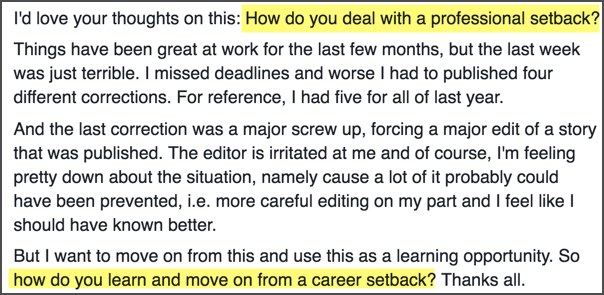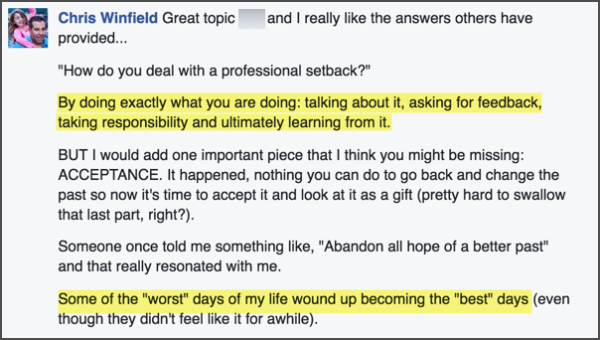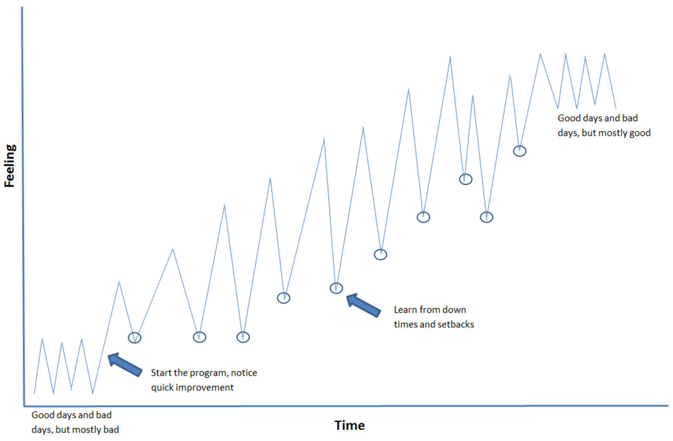How to Survive (and Thrive) When Life Punches You in the Mouth
A few weeks ago, one of my students posted this in my Facebook mastermind group (emphasis mine):

Let me start by saying that I applaud this woman for having the courage to step up, share her story, and ask for help so she can overcome this and move forward again. It’s actually pretty damn hard to admit when you’re not in a good place professionally and to then ask for help.
I wrote an initial response with my thoughts (below) but I wound up thinking more and more about this topic and it got me thinking about some of my own struggles….

How did I actually get through some of my biggest setbacks, defeats, failures and roadblocks? What did I learn along the way?
I thought about where I was, just a few short years ago, when I was part of a business that “completely imploded”…and that was after putting in 60- to 80-hour workweeks.
Ultimately, I was left pretty much broke and with no clue what I was going to do, wondering where on earth I was going to go from there. How was I going to support myself, let alone my family?
But I got through it…and I came out stronger and happier than ever. Why?
I also thought about something that I went through recently, when life “punched me in the mouth.” A few hours before I was supposed to speak to a room full of entrepreneurs, I learned that my older brother Dan had passed away.
I was completely and totally devastated…yet…I still gave that talk. Why?
Then I thought about all of the amazing people I’ve met in my life who have been through unbelievably difficult circumstances and not only made it through them, but found a way to turn it into something positive.
And then I thought of the flip side…those times when I was met with defeat and I did nothing. I cowered. I crumbled. I didn’t learn from it. And the many people I know that have done the same. Why? What was the difference?
I’ll answer all of those questions…and more…in this guide.
In it, you will find some different types of setbacks, roadblocks, and defeats, helping you better identify which ones you face, but also to remind you that you are not alone!
We’ll also cover how people normally respond to these obstacles, and why their responses aren’t helping them achieve what they want to achieve in life. (Maybe you’ll recognize some of these things in how you respond?)
I’ll even share with you stories of super successful people who faced their own setbacks, roadblocks, and defeats yet overcame them and become entrepreneurs that a lot of us look to for motivation and inspiration.
From there, you’ll learn that success isn’t “a straight line,” but don’t worry because I’m going to give you plenty of actionable things you can do (15 to be exact) right now…no matter what type of setback, roadblock, or defeat you currently face.
Because I’m a big believer in my own ability to overcome setbacks, roadblocks, and defeats—both personally and professionally.
I also believe that you have what it takes too. And that’s why I’ve created this guide…to help you realize that you have the power to overcome anything as well as to give you some tools you can use to help you deal with obstacles that are keeping you from wherever it is you want to be.
Ready? Let’s get started…
The Different Types of Obstacles We Face
Although setbacks, roadblocks, and defeats are all obstacles standing between where you are now and where you want to be, each one represents a different “level” of challenge.
Setbacks are usually relatively minor, “hiccups” really in that they don’t actually stop you. They’re more like a speed bump…they simply slow you down. Think of them as a “problem” that makes your progress harder…or success less likely.
One example of a setback would be if you had a project slated to start on Monday, but, for whatever reason, it couldn’t start until Tuesday. It’s not a huge deal, but it does force you to scramble a bit as you try to make the necessary schedule changes so everyone and everything is in place for the new time.
Now, some obstacles have a little more impact…a slightly greater punch. These are your roadblocks.
Roadblocks are obstacles that do a little bit more than just slow you down. They’re more like tar paper. They actually threaten to make you stuck. They’re something that impedes your progress…or prevents you from accomplishing something.
For instance, maybe you planned to have a project completed by Friday but something came up and you couldn’t finish it until Monday….completely missing your deadline and making your boss or client super mad at you…possibly to the point where you’re not sure if you can repair the damage.
And even if you’re able to keep your job or retain your client, you’ll probably feel some lasting effects from it.
If it’s a client, maybe you’ll no longer be the first one they go to for bids on high-paying projects. If it’s a boss, perhaps you’ll find that you’re given less important work because “you can’t be trusted.”
Again, you can bounce back from these types of issues, but it’s going to take some time (and a lot of effort!).
Which leads us to the third type of obstacle…
Defeats are the mothers of all setbacks and roadblocks…the life-changers that can force you to do a complete 180 ° and wonder, “What the heck am I going to do now??”
Examples include not getting that promotion you thought you were going to get (or was promised), or being let go.
These aren’t setbacks’ tiny little jabs designed to let you know they’re in the boxing ring with you…or even roadblocks’ punches that knock you down, but make you want to get up and try even harder.
These are TKOs…total knockouts! Not only are you on your back, but you are down for the count!
The good news is, no matter which one you face—a setback, roadblock, or a defeat—you don’t have to raise your hand and surrender.
But before we go any further, I want you to think about how you typically respond to these different types of obstacles…what’s your normal reaction?
The “Normal” Responses to These Obstacles
When face-to-face with a career-related obstacle, some of people cast blame. They point to all of the reasons or all of the circumstances that “put” them where they are.
If this is you, you might tell yourself (and probably everyone else) how the reason you got in trouble is because “My boss is a real jerk!” or that you wouldn’t have lost that promotion “…if only my cat wouldn’t have climbed that tree, causing me to be late for work…again.”
Another “normal” response to a setback, roadblock, or defeat is anger…like you’ve just been unjustly convicted of a crime you didn’t commit.
You might also feel a little frustrated or sad because you let yourself (and your employer or client) down or because you’re not quite where you wanted to be at this point in your life.
Depending on the size of the consequence you face, you might also be a little (or a lot) scared about what lies ahead.
While all of these responses are “normal,” if this is how you react, you are actually hurting yourself…
The Problem with These Responses
While it’s understandable to feel frustrated, sad, angry, and scared when dealing with a career-related obstacle, these types of “normal” responses present an issue…
…a huge issue, in fact.
None of these negative reactions, feelings or responses will help you get wherever it is you want to go. Worse yet, they can even stop you dead in your tracks!
A 2010 University of Miami study found that people in depressed states (which is where we tend to be when facing a career-related obstacle, no matter how big or small) who aren’t able to get over the obstacles in their lives were “…more likely to ruminate on their troubles.”
They become caught up in their despair like dust in a tornado, going around and around and around…using lots of energy but not really getting anywhere.
Is this how you feel? Like you’re just spinning in circles and unsure how to get out of the turmoil so you can start to move forward again?
If so, here’s something important to remember…
Setbacks Happen to Everyone (Even Really Successful People)
Every successful person, the ones we tend to look to for inspiration in our own lives, has faced their fair share of setbacks before, during and after achieving something great.
Take the late Steve Jobs, for example. He co-founded Apple (which was Macintosh at the time) at the age of 21, becoming a millionaire within two short years.
A few years after that, after having a disagreement with the company’s co-founder, the board decided to remove him from his position at Apple…essentially firing him from the very same company he helped create!
This led to a “midlife crisis” in which Jobs thought of all his other career options…
…which led him to create two more successful companies (NeXT and Pixar) before returning to Apple, which was floundering after he left.
So, even though he once found himself without a job, he was able to turn things around and lead Apple’s remarkable progression to become the world’s most valuable brand today.
Another example is Mark Cuban, who worked at a bank when he was 22 and decided that he wanted to show his entrepreneurial side by sending “notes” to the CEO about how he could save the bank money, even taking it upon himself to write a company newsletter.
Although he thought he was doing a good thing, Cuban’s boss didn’t quite feel the same, eventually calling him into his office asking him not-so-nicely who he thought he was.
Cuban ultimately left that job and moved in with friends, where he slept on the floor while working as a bartender. Sometime after that, he was hired by a PC software company earning a good salary and commission.
And he got fired again.
But he didn’t let that stop him and now he owns Landmark Theatres, Magnolia Pictures, the NBA team Dallas Mavericks, and multiple other companies he’s partnered in through Shark Tank.
All in all, his net worth is now over $3 billion!
The point in sharing stories like these is to remind you that you too can overcome whatever obstacles are in your way. And you can even find yourself in a better place!
All you have to do is develop the right strategies.
But first, you need to realize something very important…
There Are No “Straight Lines”
In Change Your Brain, Change Your Life, psychiatrist Dr. Daniel G. Amen talks about the fact that, when dealing with (and overcoming) adversity, it isn’t a linear progression.
Or, as he puts it “…no one gets better in a straight line.”

Overcoming your struggles is an up and down battle. Lots of ups and downs, in fact.
But you need both the peaks and the valleys in order to keep moving forward. The ups remind you of where you want to go and the downs push you to get there.
“Life is a series of experiences, each one of which makes us bigger, even though sometimes it is hard to realize this. For the world was built to develop character, and we must learn that the setbacks and grieves which we endure help us in our marching onward.” – Henry Ford
If you look closely at Dr. Amen’s image, you’ll notice one very important thing. Over time, the ups continue to get higher and the lows aren’t quite as “low”.
In other words, as long as you keep moving forward, overcoming the obstacles in your way, you’ll improve in the long run.
Now, you might be saying, “That’s wonderful Chris, but exactly how am I supposed to get over what’s happened to me?”
Okay, let’s dive into that now…
As with any time you want to achieve success, you need to have a plan.
Additionally, this plan must include strategies—proven, effective strategies—so you’re actually getting somewhere and not left just hanging in the wind.
Here are 15 actionable things you can do right now to help you overcome your setbacks, roadblocks, and defeats…so you emerge victorious on the other side.
#1. Give Yourself Time
Although the whole purpose of this guide is to help you get over whatever obstacles are placed in your way, one of the very first things you want to do is give yourself time to process what happened.
Let your mind absorb what has happened and fully realize where you are.
How much time should you take?
Lifehacker’s Patrick Allan suggests that, if it’s something bigger, you should “…give yourself a full 24 hours to let it out…” Whatever amount of time you choose though, Allan says to just make sure “…you stick to it.”
Come to terms with what has happened and then it’s time to figure out how to proceed from there. But whatever you do…
#2. Don’t Panic
In The Obstacle Is the Way, Ryan Holiday shares how the first American astronaut to orbit the earth, John Glenn, spent almost an entire day in space making sure his heart rate never went over a hundred beats per minute. As Holiday says, “…that’s a man not simply sitting at the controls but in control of his emotions.”
This is the same type of control you want to have when you’re faced with a setback.
Yes, give yourself time to adjust, but don’t panic either as that’s not going to help the situation at all. In fact, it would likely hurt it more than anything because then you just might do something you regret.
#3. Make Peace with Your Failures
Body Mind Mastery author Dan Millman says that “… fear of failure generates a vicious cycle that creates what is most feared.” Thus, he suggests that you “…make peace with failure” so it doesn’t keep you from reaching your potential.
Put another way: Realize that the situation is what it is, accept it, and move on.
Millman uses the example of babies learning to walk to highlight how powerful this concept can be. Can you imagine what our world would look like if, as infants, we didn’t learn to accept our repeated failures—our constant falling down—and get back up anyway?
More importantly, is that how you want to live the rest of your life? Not doing all of the things you’re fully capable of doing because you simply gave up?
Of course not.
While you can’t change what’s been done, you can choose to deal with it…and you’ll move forward when you do.
#4. Cut Yourself Some Slack (But Don’t Let Go of the Rope)
In a particularly vulnerable and powerful blog post, Tim Ferriss shared that sometimes he gets down and does things like “…hit Snooze for 1-3 HOURS…” or contemplates “…giving everything away and moving to Montreal, Seville, or Iceland…”
And yet, even though he has struggles, not wanting to get out of bed and considering moving away and starting over, he doesn’t give up. He still takes some actions that help him power through these low points so that these temporary setbacks, or lulls in productivity, don’t prevent him from achieving his goals.
He does little things like meditating twice a day and becoming closer to family. And he does bigger things like raising $100,000 for charity and adding 20 pounds of muscle mass.
He basically cuts himself some slack, but still pushes forward so that, in the end, he winds up ahead.
#5. Regain Your Control
Dr. Greg Winch, psychologist and author of The Squeaky Wheel, says that regaining as much control over your situation as possible is necessary as it can help you “…avoid feeling helpless and hopeless.”
This means looking at what actions you can take to help you overcome whatever obstacle is in your way.
For example, if you’ve just been called into the boss’ office for submitting a “subpar project,” ask yourself what you can do to keep this from happening in the future. Could you ask for an extension so you can put more time into your work and make it higher quality? What about requesting more tools to help you effectively do your job?
Think about the things you can do that are within your control and you’ll feel less out of control about the situation at hand.
#6. Let Yourself Be Vulnerable
Most people see vulnerability as weakness, but it’s actually the exact opposite.
In Daring Greatly, Brené Brown says, “Rather than sitting on the sidelines…we must dare to show up and let ourselves be seen. This is vulnerability.”
Even though you might be tempted to “sit on the sidelines,” watching all of your “teammates” who are still on the field, this will keep you in that one spot….out of the game.
Instead, let yourself be vulnerable by choosing to re-engage and take part again.
The only way to get better is to continue to play the game. And the only way to continue to play the game is to let yourself be vulnerable.
“Whatever we face, we have a choice: Will we be blocked by obstacles, or will we advance through and over them?” – Ryan Holiday, ‘The Obstacle Is the Way’
#7. Learn From Your Experience
In a 2015 interview, Brad Harker, author of The Laws of Influence, said that, when faced with adversity, we have two basic options.
Our first option is simply to “conform to it”…to give in to the fear and insecurities the adversity creates to the point where it stops us from progressing.
The other option, Harker says, is to “…humbly embrace failure as the great teacher and refining fire that has proliferated great men and women from the dawn of civilization.”
In other words, learn from what the setback or obstacle has taught you, like so many past leaders have done when faced with their own roadblocks…leaders like Thomas Edison who couldn’t speak or read at the age of 7, causing his teachers to want him removed from school and subsequently being fired time and time again, yet he never gave up and eventually brought us the power of light that we all enjoy still today.
#8. Take a “Five-Step Pause”
In Get Out of Your Own Way, authors Mark Goulston and Phillip Goldberg share that an effective way to get your mind back on the right track after a setback involves taking “The Five-Step Pause,” an action plan designed to help you react consciously instead of impulsively, potentially doing something you’ll later regret.
The five steps are:
- Increase your physical awareness. Pay attention to yourself physically, noticing any sensations (tenseness, fatigue, or pain) you may be experiencing in different areas of your body.
- Increase your emotional awareness. With each sensation, ask yourself which emotion is causing it. Is it fear? Anxiety? Frustration?
- Increase your impulse awareness. Do these emotions compel you to want to do something…to take action?
- Increase your consequence awareness. If you were to do that “something,” what are the short and long-term consequences?
- Increase your solution awareness. What other solutions exist? Which one would be most advantageous?
Follow these five steps and you’ll respond more effectively (and less impulsively) when faced with a setback, roadblock, or defeat.
#9. Stay In the Present
The more you obsess about what happened, going over every detail and reliving it over and over in your mind, the more your fear of that same thing happening again is going to hold you back.
The key then, according to Fear author Thich Nhat Hanh, is to keep yourself in the present so “…you can plan for the future in a much better way.”
Every time you feel your mind slipping into the past, replaying what happened (or didn’t happen), bring it back to the here and now.
This will help you focus on where you are at the moment, the only point in time you have the control to change.
“We can let the circumstances of our lives harden us so that we become increasingly resentful and afraid, or we can let them soften us and make us kinder and more open to what scares us. We always have this choice.” – Pema Chodron
#10. Instead of Trying to “Bounce Back,” Just Move Through
Have you ever experienced a setback, just to have someone say, “It’s okay; you’ll bounce back!”?
While their statement is probably well-intentioned, Resilience author Eric Greitens explains that it isn’t practical because “…what’s done cannot be undone.”
You can’t “bounce back” to a previous point in time; all you can do is move through where you are and progress forward.
“Nothing in this world can take the place of persistence. Talent will not: nothing is more common than unsuccessful men with talent. Genius will not; unrewarded genius is almost a proverb. Education will not: the world is full of educated derelicts. Persistence and determination alone are omnipotent.” – Calvin Coolidge
This means letting go of the desire to get things back to “the way they were” and, instead, figuring out how to deal with where are so you can move forward in a new (better) way.
This will get you further ahead in the long run.
#11. Know What You Want
When you face a stumbling block in your career, something that prevents you from moving ahead, it’s the perfect time to ask yourself what you really want.
Why is this so important?
Because, as Paulo Coehlo says in The Alchemist, “…when you want something, all the universe conspires in helping you to achieve it.”
Granted, you may not get it by following the exact path that you had planned, but if deep down in your heart you want to achieve something specific in your career, it will happen.
One way or another, it will be.
#12: Think Systems Versus Goals
Goals are great in that they can move you forward…especially after experiencing a setback.
However, as Dilbert creator Scott Adams points out in How to Fail at Almost Everything and Still Win Big, this way of thinking does have its faults as people who set goal after goal “…exist in a state of continuous presuccess failure at best, and permanent failure at worst if things never work out.”
In other words, you’re always striving for success and never reaching it because, once you do, you set a new goal! That’s why Adams suggests that you focus on systems (processes) versus goals (outcomes).
This ultimately gives you greater success while limiting your feelings of frustration and discouragement if you’re not getting the exact outcomes you’d hoped for.
#13. Get In Touch with Your “Inner Freak”
While most people think of being a freak as a negative thing, in The Entrepreneur Roller Coaster, Darren Hardy explains that it’s actually a good thing as far as being an entrepreneur is concerned because a freak is nothing more than “…a person who is obsessed with or unusually enthusiastic about a specific interest.”
In other words, if you’re facing a setback, roadblock, or defeat that threatens to dampen your career-related enthusiasm, don’t let it.
Instead, get in touch with your “inner freak” and use your passion to help you push through.
Let it give you the energy you need to reach wherever it is you want to go.
#14. Move Beyond the Negativity
We already talked about the fact that feeling negative when you’re faced with a setback is completely “normal.” However, moving beyond this type of negativity is absolutely critical if you want to ultimately succeed.
“If you have a positive attitude and constantly strive to give your best effort, eventually you will overcome your immediate problems and find you are ready for greater challenges.” -Pat Riley
While cutting yourself some slack can help with this, acknowledging your negative thoughts is actually the first step to this process.
Admit that you’re feeling frustrated, sad, or angry so you can ultimately release these emotions and continue moving ahead.
Also, if the negativity is coming from someone around you, Travis Bradberry, suggests that you reduce the amount of time you spend with that person.
Or, as he puts it, “If the complainer were smoking, would you sit there all afternoon inhaling the second-hand smoke?” Of course you wouldn’t.
So let them be negative, but force them to do it without you.
#15. Practice Gratitude
I write about the power of gratitude a lot, how it has the ability to truly transform your life, and this is no exception.
When you’re faced with an obstacle, something that stands between where you are now and where you want to be, having gratitude in your heart and being truly thankful for what you do have puts you in a better spot mentally, emotionally, and spiritually.
Brene Brown talks about this in The Gifts of Imperfection, outlining how “actively practiced gratitude” can increase the level of joy you feel in your life.
Take the time to appreciate what’s going right in your life versus focusing on what’s wrong. You’ll feel much better when you do!
Just Take Action!
Wharton professor and best-selling author, Adam Grant, shares that, in life, failure comes in two ways: your actions and your inactions. Furthermore, “…when people reflect on their biggest regrets, they wish they could redo the inactions, not the actions.”
Thus, taking the actions recommended in this guide will likely lead to less regret in the long run.
When life knocks you down, get back up. And when it knocks you down again, get back up again.
That’s how you overcome setbacks, defeats, and roadblocks.
By taking one action at a time…
Want To Go Further?
I put together a special bonus area for Buffer readers with an eBook version of this guide…plus ‘The Ultimate Guide to Becoming Your Best Self’ eBook, a daily habit builder worksheet and a guide with 40 powerful morning habits!
Try Buffer for free
180,000+ creators, small businesses, and marketers use Buffer to grow their audiences every month.
Related Articles

I've tried 57 productivity tools in the past year. These are the ones I keep coming back to.

Looking for some low-lift ways to make yourself happier? Here's some of the best research that we've found on personal happiness.

I went from occasional AI user to power user in months. How? My mindset for how to approach AI evolved. Now, I reach for AI every day. I once read that professionals aren’t going to be replaced by AI, rather, they will be replaced by other professionals who use AI. This idea that someone who leverages AI will perform better at their work is now supported by research. Harvard Business School published a paper where they compared a group of consultants using AI to another group that wasn’t using